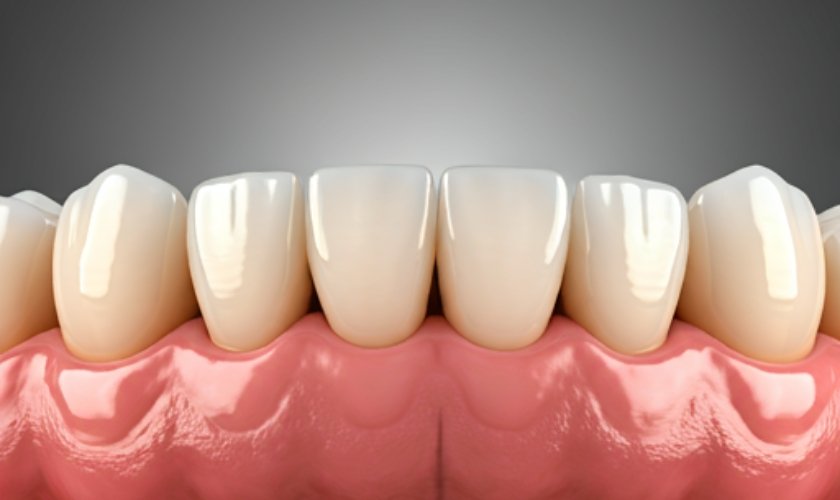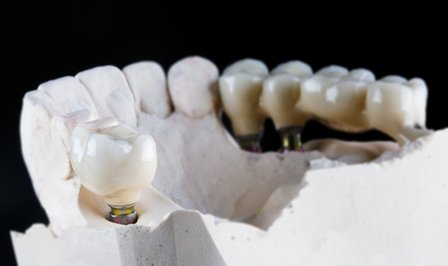

Dental bridges are a common option for tooth replacement, offering both functionality and aesthetic benefits. If you’re considering dental bridges for your teeth, it’s crucial to understand their impact on your oral health.
This blog explores how dental bridges affect your gums and teeth, enabling you to make an educated choice regarding your dental treatment.
Know About Dental Bridges
Dental bridges are prosthetic devices that are used to fill gaps caused by missing teeth. They consist of:
- Anchor Teeth (Abutments): These are natural teeth or dental implants that support the bridge.
- False Teeth (Pontics): These replace the missing teeth and are anchored in place by the abutments.
Bridges are permanently cemented into place, functioning like natural teeth. They restore your smile and make eating and speaking more comfortable.
How Dental Bridges Affect Your Teeth?
Dental bridges for teeth can significantly impact your oral health in several ways:
1. Support for Adjacent Teeth
When a tooth is lost, the neighboring teeth can shift out of alignment. This can lead to bite issues and additional dental problems. A dental bridge helps stabilize these adjacent teeth by filling the gap, preventing them from moving. This support maintains proper bite alignment and reduces the risk of misalignment.
2. Prevention of Tooth Shifting
Without a bridge, the space left by a missing tooth can cause nearby teeth to tilt or shift. This shifting can result in bite problems and uneven wear. By placing a bridge, you help keep your teeth in their correct positions, minimizing the risk of these issues. Maintaining proper alignment with a bridge helps avoid complications such as difficulty chewing or speaking.
3. Chewing and Speaking Comfort
Speaking and chewing might be difficult when a tooth is missing. With dental bridges, your teeth are functional again, enabling you to eat a variety of foods comfortably and speak clearly. This restoration improves your overall quality of life by providing better functionality and confidence in social interactions.
How Dental Bridges Impact Gums?
Dental bridges also affect your gums in several ways. You can effectively maintain your dental health by being aware of these implications.
1. Gum Health
Bridges cover the area where a tooth was lost, offering protection to the underlying gums from food particles and bacteria. However, it’s vital to maintain good oral hygiene to prevent plaque buildup around the bridge. If plaque accumulates, it can lead to gum inflammation or infection, which can affect both the gums and the surrounding teeth.
2. Gum Irritation
Sometimes, the area where the bridge meets the gums can become irritated, especially if the bridge does not fit perfectly. This irritation can cause discomfort. Properly fitted bridges should minimize such issues, but if you experience persistent discomfort, it’s important to visit your dentist for an adjustment. Ensuring a good fit helps prevent irritation and supports gum health.
3. Cleaning and Maintenance
To prevent gum disease, regular cleaning of dental bridges is essential. Use a soft-bristled toothbrush and dental floss designed for bridges to keep the area clean. Your dentist can provide specific recommendations on maintaining your bridge and oral hygiene. Regular brushing and flossing help prevent plaque buildup, which is crucial for long-term gum health.
Advantages of Dental Bridges
Dental bridges for teeth offer several benefits, including:
- Restoring Function: Bridges enable you to chew and speak more naturally, improving your daily activities.
- Aesthetic Improvement: They fill in gaps and enhance your smile, contributing to a more attractive appearance.
- Cost-Effective: Bridges are generally more affordable than dental implants, making them a practical option for many people.
Tips for Long-Term Oral Health with Dental Bridges
To ensure that your dental bridges continue to benefit your oral health, follow these tips:
- Regular Dental Check-ups: Routine visits to your dentist assist in keeping an eye on your bridge’s state and your general dental health. It’s vital to have routine examinations in order to identify any issues with the bridge or surrounding teeth.
- Good Oral Hygiene: Brush your teeth twice a day and floss daily to prevent plaque buildup around the bridge. It is important to practice good dental hygiene to avoid gum disease and more dental issues.
- Avoid Hard Foods: Be cautious with hard foods that can damage the bridge or surrounding teeth. Eating a balanced diet and avoiding excessive pressure on the bridge helps maintain its integrity.
When to Consult Your Dentist?
If you experience any of the following issues, it’s important to consult your dentist:
- Pain or Discomfort: Persistent pain or discomfort may indicate a problem with the bridge. Your dentist can assess and address any issues.
- Loose Bridge: A bridge that feels loose or unstable requires immediate attention. Prompt adjustments or repairs can prevent further complications.
- Changes in Bite: Any changes in how your teeth align when you bite should be evaluated by your dentist. Ensuring a proper bite alignment is crucial for long-term comfort and functionality.
Dental bridges for teeth are an effective way to improve your dental health and replace lost teeth. By understanding how they affect your teeth and gums, you can take steps to ensure their longevity and maintain your overall dental well-being. Always follow your dentist’s advice and practice good oral hygiene to keep your dental bridge in excellent condition.
Frequently Asked Questions
Yes, you can eat normally with a dental bridge. However, it’s advisable to avoid very hard or sticky foods that could damage the bridge or affect its fit. Following a balanced diet and chewing evenly can help maintain your bridge’s integrity.
Care involves brushing your teeth twice a day, flossing daily, and using an antibacterial mouthwash. It’s also important to clean the area around the bridge with floss designed for bridges or an interdental brush.
Yes, dental bridges can be replaced if they become damaged, worn out, or if the underlying supporting teeth or gums are compromised. Your dentist will evaluate the condition of your bridge and recommend the appropriate action.





